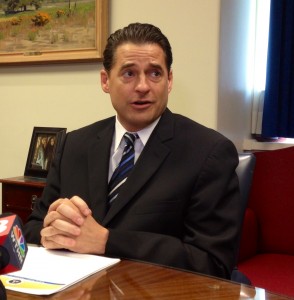Halftime Report: How Is The General Assembly Doing So Far?
The Indiana General Assembly passed the halfway mark of its 2015 session Wednesday.
Gov. Mike Pence was the first to dub this the “education session” back in December, when he announced his administration’s legislative priorities. He says he thinks things are moving along smoothly.
“I’m very encouraged at the level of collaboration that’s taking place in broad and bipartisan fashion on priorities of this administration, chief among them is in the area of education,” Pence says.
On the other side of the aisle, House Minority Leader Scott Pelath, D-Michigan City, says his party has differences in approach with respect to education.
“When the right arguments are made, some of your hardcore conservatives will join forces with us in a pragmatic way to make sure that our classrooms are protected,” Pelath says. “We have reminded the House majority and the Senate majority and the governor that just because they might have 71 percent of the seats, doesn’t mean that 71 percent of the people agree with them.”
Let’s break down how these leading lawmakers think about what their parties have accomplished so far, and what they hope to do as the session continues.
School funding formula
The issue: Under the House-approved budget, schools would get roughly $400 million more dollars over the next two years than they did in the last state budget. The biggest changes include an increase in the base amount of funding per student (called “foundation“) each of the next two years, as well as a change in the way “at-risk” students are defined. This could mean less money for a lot of urban districts, which are tending to see a decline in enrollment right now, combined with generally higher numbers of at-risk students.
Pence: “I very much support the principal of raising the foundation in our school funding formula as a means of ensuring that school districts all across the state of Indiana have additional resources. I’m very confident we’ll get to the end of the day and this will be fair to all concerned. We want all the ships to rise in Indiana.”
Pelath: “With the same amount of money that the Republicans proposed to spend on education, we offered a different way to distribute it. We offered a way to make [our school funding] more honest and more transparent by putting our three different school systems under three different pots of money. We know where most of the money continues to go. That’s not really going to change radically. But you can make it a little easier on the bottom end, and allow them to catch up so they can continue to phase out some of their fixed costs.”
Vouchers
The issue: Pence has asked the legislature to lift the cap on the dollar amount that schools in the state’s choice scholarship program receive per student, as well as raising the cap on the scholarship tax credit program. A report released earlier this week disclosed that school voucher recipients increased by nearly 50 percent in 2015.
Pence: “I’ve long believed there’s nothing that ails education that can’t be fixed if you give parents more choices and teachers more freedom to teach. I honestly believe that the demand that’s reflected in the increased applications is an affirmation that more parents are interested in having more choices. Whether that’s going to a different public school, whether it’s going to a different public charter school, or whether it’s going to a private school, in the case of a voucher, and I support that.”
Pelath: “You have to separate those things out so you can ascertain what the growth is, you can control the growth and you can better understand what’s working and what isn’t and adjust the funding accordingly.”
Changing ISTEP+
The issue: One bill that passed through the Senate during the first half of the session proposes doing away with the state-crafted ISTEP+, and perhaps moving toward using a national test. With plenty of drama already over this year’s spring test – including technology, timelines and test length – many see this as a common-sense idea for the future.
Pence: “It’s important that we measure students performance, and it’s important that we grade our schools just like we grade our kids and make that information available to parents going forward.”
Pelath: “Making testing simpler and less expensive and less long, those are generally positive goals and I think they merit some degree of pursuit.”
Both the House and Senate return to session Monday.



